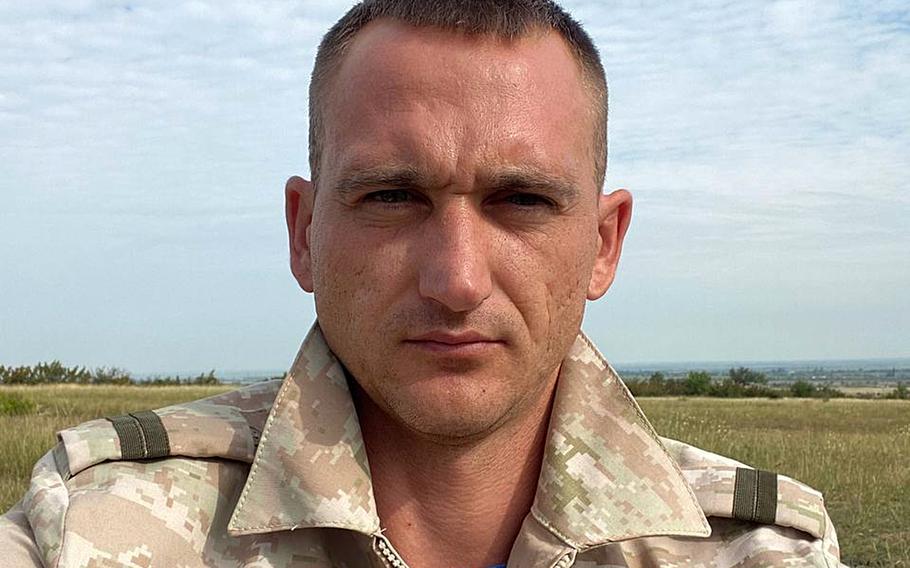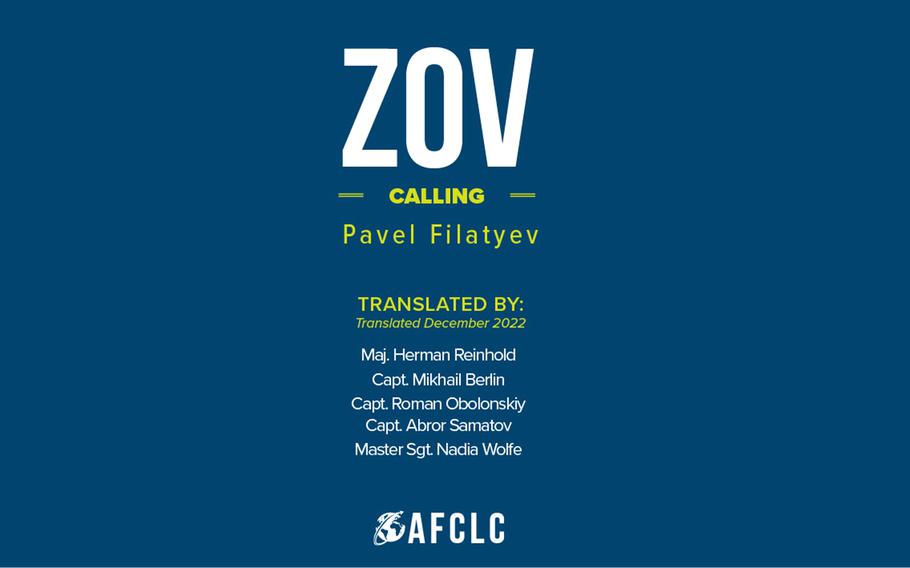
Former Russian paratrooper Pavel Filatyev e-published a 140-page memoir titled "Zov," meaning "Calling," a criticism of Russia's invasion of Ukraine and the Russian army. It was translated in December 2022 by native Russian speakers in the Air Force's Language Enabled Airman Program. (Facebook/Pavel Filatyev)
Former Russian paratrooper Pavel Filatyev was so disillusioned with the war in Ukraine that he risked his life to publish an unsparing firsthand account, which can now be read in English thanks to the work of American airmen.
Before the retrospective, titled “Zov,” or “Calling,” was removed from the social media site VKontakte, where it was initially posted in August 2022, Air University scholars copied it.
Then native Russian speakers in a special Air Force language program produced what the service says is the first complete English translation of the 144-page memoir.
“It’s definitely him pouring his soul out,” said Capt. Mihkail Berlin, a Russian language instructor at the Air Force Academy who helped with the translation. “It’s more of a personal journal.”

In 2022, former Russian paratrooper Pavel Filatyev e-published a 140-page memoir titled “Zov” on his page on Russian social media site VKontakte. His firsthand account of the invasion of Ukraine was translated by five members of the Air Force’s Language Enabled Airman Program and posted on the Air University website. (U.S. Air Force)
Filatyev described cold nights without a sleeping bag and units being issued rusty, broken rifles and ill-fitting uniforms and boots. Rations quickly dwindled and the higher command was nowhere to be found, according to Filatyev.
“In this war, they just decided to drown Ukraine with our corpses,” he wrote.
Filatyev and his comrades didn’t know they were invading Ukraine until their military trucks rumbled across the border on Feb. 24, 2022, the author said.
“Everyone is riding in bewildered silence, surely there is a plan,” he wrote.
As it turned out, there wasn’t.
Before he was evacuated because of an eye injury two months into the war, Filatyev vowed to do “everything to change this” if he survived.
LEAP of fate
Berlin and four other Russian speakers in the Air Force’s Language Enabled Airman Program, or LEAP, translated the manuscript in December.
The LEAP translators split the work into about 30 pages each, devoting hours outside their normal Air Force jobs to complete the project in about a month, they said. The finished document, now at 77 pages, is available to read on the Air University website.
Part of the Air Force Culture and Language Center, the program currently supports some 4,200 scholars representing 96 languages. The “Zov” translators said the project shows the importance of maintaining diverse language fluency in the force.
The document is being used in Air Force academic circles to examine the conflict from the Russian side and inform students of the conditions on the ground early in the war, they said.
Earlier publications of Filatyev’s account were translated using artificial intelligence, said Maj. Roman Obolonskiy, a LEAP airman on the project.
“Artificial intelligence is just not there yet to incorporate all the jargon and Russian as a living language,” he said.
Obolonskiy, a director of operations for a C-17 maintenance unit at McGuire Air Force Base, N.J., consulted Russian military forums and other sources to research military vocabulary.
A glossary tacked on to the end of the document lists more than a dozen military terms. “Starley,” for example, is slang for a senior lieutenant, while “kombat” is short for battalion commander.
Master Sgt. Nadia Wolfe, who was born in Kyrgyzstan, initially was puzzled when Filatyev described being “surrounded by grenades, ammunition and rocks,” she said. “I took a second look at ‘rocks.’ Why was he surrounded by rocks?”
The NSV Utyos is a Soviet-era heavy machine gun. The word “utyos” also can mean cliff or rocks.
Colloquial speech and swear words also colored the manuscript, Berlin said.
Cursing in Russian is “kind of a sublanguage of its own,” he said, noting that Russian has more than 10,000 swear words and combinations.
“Funny enough, we were trying to prepare for the upper classmen a class on Russian swear language,” Berlin said. “There’s enough (in Russian) to fill a whole semester’s worth.”
Since the war started, the number of language assistance requests has increased for many of the service’s Russian LEAP scholars, the translators said. And there’s an increased demand for Ukrainian speakers.
Russian is being spoken much less frequently by Ukraine’s military and citizenry, both as a matter of cultural pride and battlefield strategy, said Berlin, who now is studying Ukrainian.
Berlin, 34, was born in Russia and came to the United States at age 15. His mother didn’t want him to be drafted. He ended up joining the Army at the age of 17 and later switched to the Air Force.
Berlin lived through the post-Soviet 1990s in Russia, when “corruption was at an all-time high,” he said.
In reading “Zov,” it’s clear “that nothing has changed,” he said. “It remains the same or maybe even it’s become worse.”
Obolonskiy, who was born in Ukraine and came to the U.S. at age 11, said he “failed to grasp the severity” of the corruption.
He pointed to examples of military incompetence that sound almost comical. Filatyev was told to jump out of his vehicle, set up his mortars and then move them, and nobody knew why, Obolonskiy said.
During training, they were told to go out and shoot, but not enough weapons were available and there were no bullets, he said.
“Apathy, corruption, incompetence, we can grab just about every bad word in the English language for organizational structure and it will fit,” Obolonskiy said.
Wolfe, a medical logistics flight chief at Robins Air Force Base, Ga., was surprised by Filatyev’s frankness.
“His description of military confusion and hurry up and wait,” she said. Also, it seemed as if “officers and enlisted were not even working on the same side or on the same objectives.”
Rage against the war machine
Filatyev’s story stands as one of the few open-source war accounts from the perspective of a Russian soldier.
His descriptions are detailed, jarring and sometimes poetic, while he seethes with rage when critiquing his government for starting “a terrible war” in a country “where most of our relatives live.”
He also directs anger at his fellow citizens for idly standing by and contributing to the corruption that he says permeates every aspect of Russian society.
“I do not know how to convey to millions of zombies with Russian passports that we ourselves are to blame for everything that is happening. It is us,” he wrote.
He is now living in France, where he has applied for asylum. After his eye healed, his choices were return to the war or face prosecution, Germany’s Der Spiegel magazine reported in October. He fled Russia shortly after publishing his memoir.
Besides being gripping prose, “Zov” is also rife with lessons for U.S. military planners, the translators said.
“When funds and resources are misappropriated and misused, it results in the mission not being completed,” Berlin said.
For Obolonskiy, the numerous miscalculations of Russia’s might stood out in light of Filatyev’s exposure of the rot in the Russian armed forces.
Analysts thought “Russia had the second-most powerful military in the world and this war would be over in a couple of weeks,” he said. “Yes, they did have ‘X’ amount of vehicles, but only a small percentage of them were functional.”
“We need to be able to learn those lessons, apply them to future adversaries and maybe evaluate ourselves as well,” Obolonskiy said. “Do we ourselves fit the criteria? So it matters for us, too.”